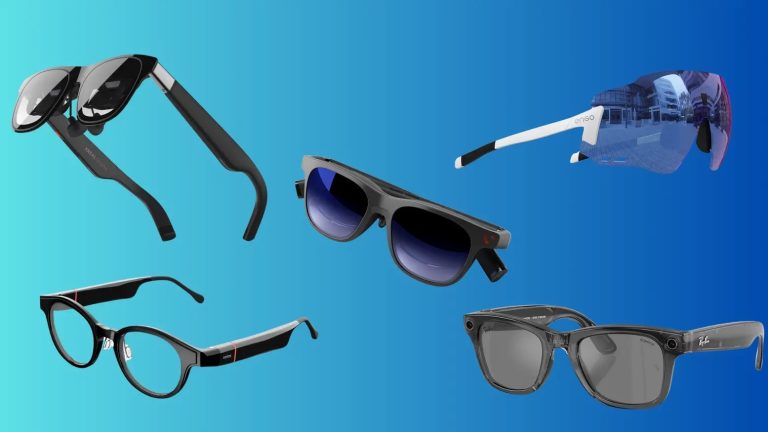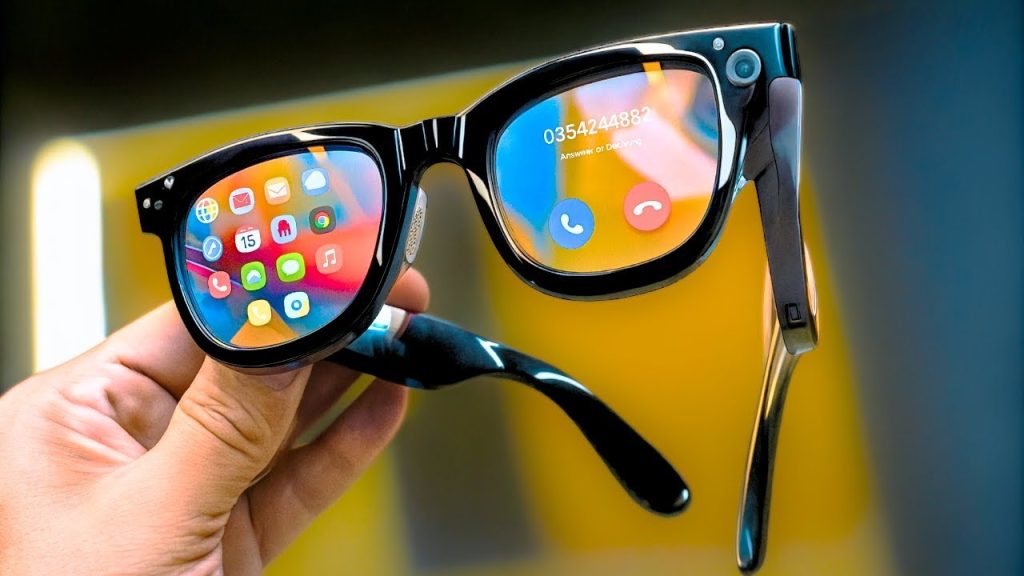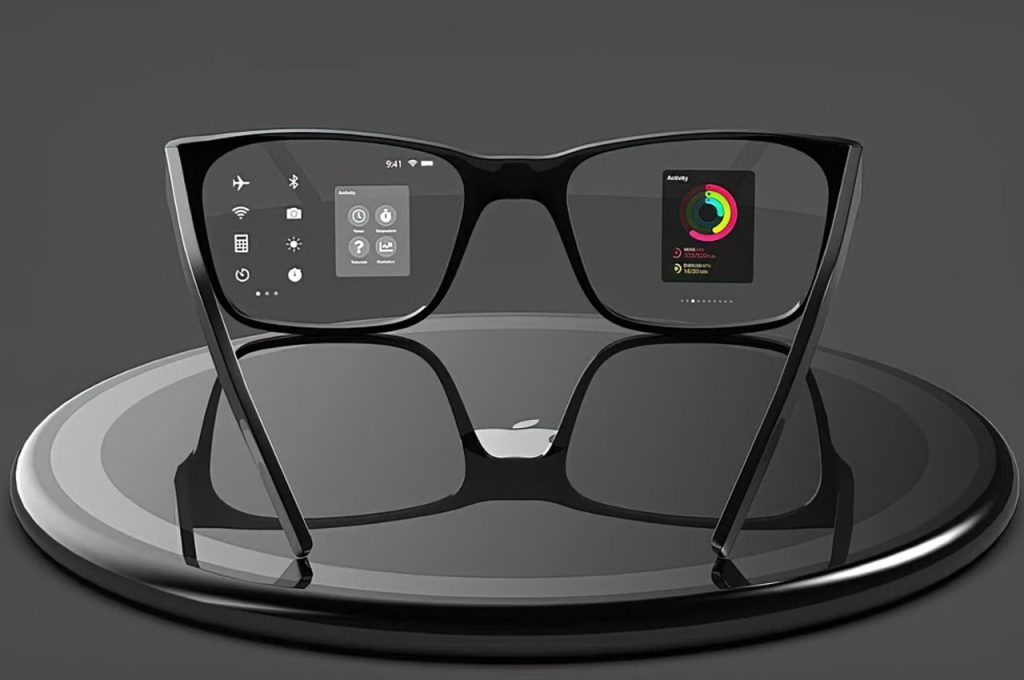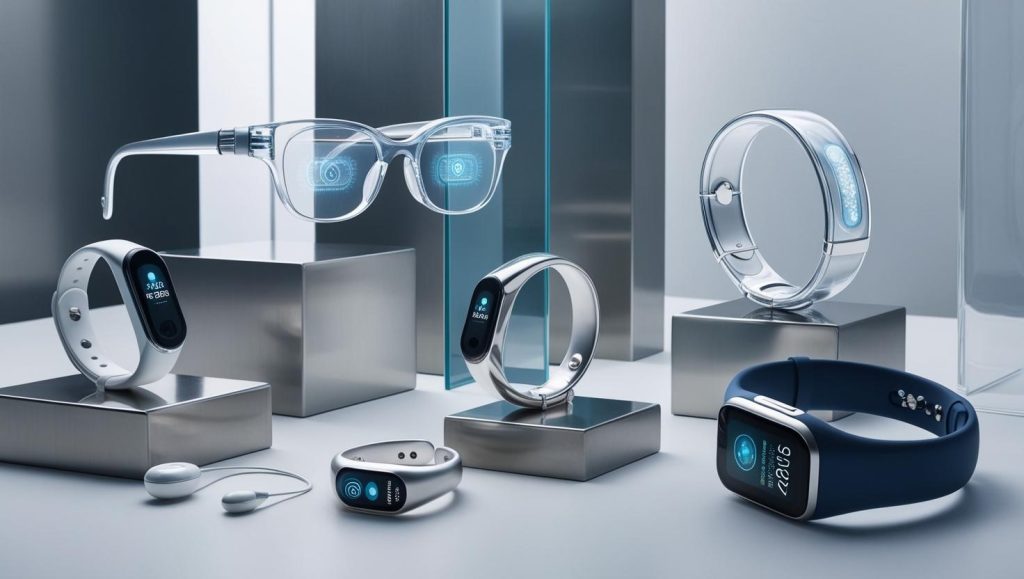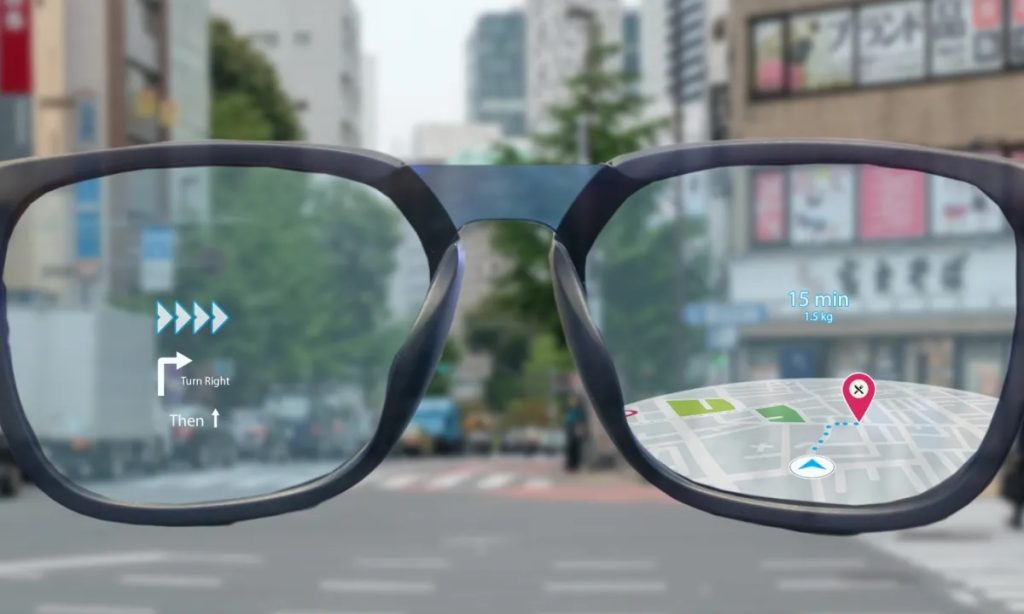The year 2025 might be remembered as the moment when augmented reality glasses stepped out of sci-fi movies and into our daily lives. For years, tech giants promised us sleek, stylish glasses that could project digital worlds into our reality without making us look like a cyborg on a coffee run. Now, with Meta’s Ray-Ban Meta AI glasses gaining traction and whispers of Apple AR glasses 2025 getting louder, the question isn’t “if” but “when” smart glasses will become as common as smartwatches.
But are AR smart glasses finally ready for the mainstream crowd? Or will they remain a futuristic toy for early adopters and tech enthusiasts? In this deep dive, we’ll explore where the smart glasses 2025 market is headed, how Apple and Meta are shaping the battlefield, and whether these futuristic frames can truly redefine the next wave of wearable tech trends 2025.
The evolution of smart glasses – from flop to future
Smart glasses didn’t exactly have the smoothest start. Back in 2013, Google Glass was pitched as the next big thing in wearable tech, but let’s be honest-it made you look more like a lab assistant than a trendsetter. Privacy concerns, clunky design, and limited features pushed it to the sidelines.
Fast forward to today, and things look very different. The AR smart glasses market is heating up with stylish, lightweight designs that blend fashion and function. Instead of bulky headgear, we now have frames that look like everyday eyewear but can answer calls, display notifications, and even layer digital content over the real world.
This shift is no accident. Advances in AI smart glasses have made voice commands smarter, while miniaturized sensors and better displays mean you don’t need to strap a computer to your head to experience augmented reality. Combine that with the consumer appetite for seamless, hands-free tech, and suddenly smart glasses are no longer a punchline-they’re a trend that’s hard to ignore.
Meta’s big play – Ray-Ban Meta AI glasses
Meta has been quietly rewriting the smart glasses playbook with its partnership with Ray-Ban. The Ray-Ban Meta AI glasses launched with a very different strategy from the Google Glass era: style first, tech second. By disguising cutting-edge tech inside frames that look like iconic Ray-Bans, Meta has managed to dodge the “geeky gadget” stigma that doomed earlier attempts.
So, what makes them special in 2025? These glasses now feature a built-in AI assistant, seamless social media integration, and even the ability to livestream directly from your face. Instead of fumbling for your phone, you can snap photos, record videos, or ask your AI to identify landmarks and translate signs-all while looking effortlessly cool.
Meta’s bet is simple: if smart glasses look just like regular glasses, people will wear them. And if people wear them, suddenly AR becomes a natural part of daily life. This is Meta’s Trojan horse-get consumers hooked on stylish glasses today, and tomorrow introduce more advanced augmented reality glasses features as people grow comfortable with the idea of wearing tech on their face.
In short, Meta isn’t just selling glasses-it’s selling a lifestyle where AI is literally at eye level.
Apple AR glasses 2025 – the most anticipated wearable?
If there’s one company that can take a niche gadget and turn it into a global phenomenon, it’s Apple. Remember when the smartwatch was “just another gimmick”? Then the Apple Watch came along and quietly became the world’s best-selling watch. Now, all eyes are on Apple AR glasses 2025, rumored to be the company’s sleekest-and possibly boldest-wearable yet.
Apple’s approach is shrouded in its usual secrecy, but leaks and analyst reports paint an exciting picture. The glasses are expected to integrate seamlessly with the Apple ecosystem-think iPhone, Apple Watch, and Vision Pro working together. Instead of strapping a bulky headset on, users could slip on a pair of stylish glasses that project notifications, directions, or even immersive AR overlays straight into their field of vision.
Unlike Meta, Apple’s focus is likely on premium experiences: razor-sharp displays, privacy-first AI, and an elegant design that doesn’t scream “tech gadget.” If the company nails the balance between form and function, Apple could do for augmented reality glasses what it did for the smartphone-make them mainstream almost overnight.
Industry analysts believe the launch could redefine the AR smart glasses market, pushing competitors to level up. In true Apple fashion, it won’t just be about the device-it will be about the ecosystem. Imagine getting a call on your iPhone, glancing at your glasses to see who’s calling, and answering with a subtle gesture. That’s the kind of everyday magic Apple is betting on.
Are AR glasses mainstream in 2025?
So, are we finally living in the age of mainstream smart glasses 2025? The answer is… almost. While the buzz is louder than ever, adoption is still in its early stages. Unlike smartphones or smartwatches, AR glasses face unique hurdles:
Why AR glasses are gaining momentum
- Fashion-forward designs – Brands like Ray-Ban and Apple are prioritizing style, making the glasses something you actually want to wear.
- Hands-free convenience – Checking maps, messages, or even recipes without pulling out your phone is surprisingly addictive.
- AI integration – With smarter assistants, AI smart glasses are becoming genuinely useful, not just gimmicky.
- Wearable tech trends 2025 – Consumers are already comfortable wearing gadgets like watches, earbuds, and fitness trackers, paving the way for glasses.
What’s still holding them back
- Battery life – Packing displays, cameras, and AI into frames often means short battery runtimes.
- Privacy concerns – Walking around with hidden cameras makes people nervous (just ask Google Glass alumni).
- Price – Premium models could cost as much as a flagship smartphone-or more.
- Killer apps – Until AR glasses offer an “iPhone moment” app that changes how we live, mass adoption might lag.
At this point, AR glasses are edging into the mainstream conversation, but they’re not yet on every face in the coffee shop. The next couple of years-especially with Apple AR glasses 2025 in play-will be crucial in deciding whether they become the new norm or remain a tech enthusiast’s dream toy.
Best AR glasses 2025 – top contenders to watch
With so many players entering the race, 2025 is shaping up to be the year where consumers finally get real choices in augmented reality glasses. Here are some of the most promising contenders:
1. Apple AR glasses (expected 2025)
The most hyped product of the year, Apple’s upcoming release could set the gold standard for the industry. Seamless integration with iPhone and Vision Pro is expected to make it a must-have for Apple fans.
2. Ray-Ban Meta AI glasses
Already on the market, these glasses are a hit thanks to their stylish design and AI features. They’re less about hardcore AR overlays and more about everyday convenience-perfect for early adopters who want smart glasses that don’t scream “tech toy.”
3. Xreal Air 2 Pro
Formerly known as Nreal, Xreal continues to push lightweight AR glasses at a competitive price. Their focus is on immersive media experiences, letting users watch movies on a “giant virtual screen” right from their lenses.
4. Lenovo ThinkReality A3
Targeted more toward enterprise, Lenovo’s glasses are designed for productivity-think virtual monitors and collaboration tools. Not the most stylish, but very practical for professionals.
5. TCL RayNeo X2
TCL is making moves in the consumer market with AR glasses that emphasize entertainment, navigation, and real-time translation. They may not have Apple’s polish, but they’re offering affordable innovation.
Together, these models showcase how diverse the best AR glasses 2025 market is becoming. From enterprise to fashion-forward consumer options, there’s now something for everyone.
Wearable tech trends 2025 – beyond smart glasses
Smart glasses may be stealing the headlines in 2025, but they’re just one piece of a much larger puzzle. The wearable tech trends 2025 landscape is expanding faster than ever, with gadgets becoming more personal, more fashionable, and more intelligent.
Smartwatches and health tech
Apple Watch, Samsung Galaxy Watch, and Fitbit are still thriving, but now they’re leaning heavily into health. Blood sugar tracking, stress monitoring, and AI-powered wellness suggestions are turning wearables into digital doctors on your wrist.
Smart earbuds and voice-first computing
Earbuds like AirPods and Pixel Buds are becoming AI gateways. They’re no longer just for music-they’re real-time translators, fitness coaches, and even companions for ambient computing. Combined with smart glasses, they create a hands-free ecosystem where you rarely need to touch your phone.
Clothing that computes
Yes, really. Smart fabrics and embedded sensors are finding their way into jackets, shoes, and workout gear. Imagine a running shirt that tells you when your posture slips or a pair of sneakers that adjust cushioning based on terrain.
The bigger picture
What ties all of this together is AI. From AI smart glasses to AI-powered earbuds, wearables are no longer just accessories-they’re part of a larger ambient intelligence system. The vision is simple: your devices understand you, anticipate your needs, and work together invisibly.
Smart glasses may be the flashiest face of this movement, but they’re not alone. They’re part of a broader shift where technology is no longer something we carry-it’s something we wear.
The future of AR smart glasses – challenges and opportunities
The road to mainstream adoption is exciting but bumpy. As much as smart glasses 2025 are gaining buzz, the industry still faces serious challenges-and massive opportunities if they can solve them.
Key challenges ahead
- Privacy fears: Hidden cameras and always-on microphones raise real concerns. Without transparency and clear indicators, adoption could hit a wall.
- Tech limitations: Battery life, display brightness in sunlight, and processing power in tiny frames remain tough engineering puzzles.
- Social acceptance: Even if they look fashionable, there’s still a cultural learning curve-people need to get used to talking to their glasses in public.
- Regulation: Governments are already considering rules for how AR devices can capture and share data.
Big opportunities
- Productivity boost: Imagine AR glasses replacing multiple monitors, guiding remote work, or offering real-time collaboration.
- Healthcare applications: From surgical overlays for doctors to real-time assistance for patients with vision impairments, AR could change lives.
- Entertainment & gaming: The gaming industry is eager to embrace immersive AR worlds that blend seamlessly with reality.
- Everyday convenience: Navigation, translations, recipes, shopping-small tasks become easier when you don’t need to reach for your phone.
If Apple and Meta can overcome the trust issues and technical hurdles, augmented reality glasses could become as common as smartphones in the next decade. The leap from novelty to necessity may be closer than we think.
Conclusion – are AR glasses finally ready for prime time?
The year 2025 could go down as the turning point for AR smart glasses. Meta has already proven there’s a market for stylish, AI-powered eyewear with its Ray-Ban partnership, while Apple is preparing to unleash a device that might push the entire industry into the spotlight.
Still, it’s too early to say smart glasses will be as universal as smartphones anytime soon. Challenges like privacy, pricing, and battery life remain, but momentum is undeniable. With fashion-forward designs, AI integration, and growing consumer comfort with wearables, AR glasses are on the cusp of becoming part of everyday life.
So, are AR glasses mainstream in 2025? Not fully-but the path is clearer than ever. And with Apple and Meta battling for dominance, the next few years might just decide whether smart glasses are the next iPhone moment… or just another passing trend.
FAQ – smart glasses 2025
- What are AI smart glasses?
AI smart glasses are wearable devices that combine augmented reality with artificial intelligence, allowing users to interact with digital information through voice commands, smart overlays, and real-time assistance. - Will Apple release AR glasses in 2025?
Apple is widely expected to launch its Apple AR glasses 2025, though details are still under wraps. Analysts predict a stylish design with deep ecosystem integration. - Are AR glasses mainstream yet?
Not quite. While adoption is growing, AR glasses still face challenges like cost, privacy concerns, and technical limitations. 2025 marks a big step, but they’re not yet as common as smartphones or smartwatches. - What are the best AR glasses 2025 available now?
Top contenders include Ray-Ban Meta AI glasses, Xreal Air 2 Pro, Lenovo ThinkReality A3, and TCL RayNeo X2. Apple’s AR glasses are the most anticipated release of the year. - How do smart glasses fit into wearable tech trends 2025?
Smart glasses are part of a larger wearable ecosystem that includes smartwatches, earbuds, and health-tracking wearables. Together, these devices aim to create seamless, AI-powered everyday experiences.

